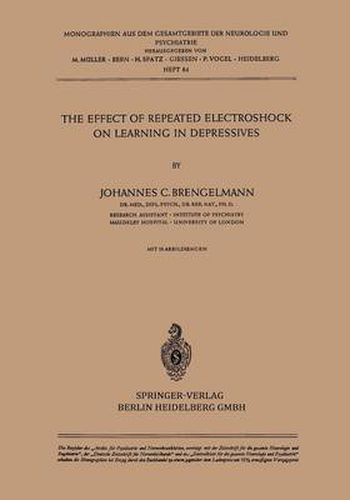Readings Newsletter
Become a Readings Member to make your shopping experience even easier.
Sign in or sign up for free!
You’re not far away from qualifying for FREE standard shipping within Australia
You’ve qualified for FREE standard shipping within Australia
The cart is loading…






This title is printed to order. This book may have been self-published. If so, we cannot guarantee the quality of the content. In the main most books will have gone through the editing process however some may not. We therefore suggest that you be aware of this before ordering this book. If in doubt check either the author or publisher’s details as we are unable to accept any returns unless they are faulty. Please contact us if you have any questions.
Although clinical observations abound, substantiated evidence concerning the effect of electroshock treatment on learning capacity, particularly in depressed patients, is scanty and experimental findings have been conflicting. The experiments reported here were accordingly conducted as a pilot investiga tion, visual learning tests involving spatial relations being used to examine in depressed patients: - (a) The extent to which a single electroshock (ES) impairs learning capacity, and the amount of its restoration 30 min, four hours and twenty-eight hours after shock. (b) The effect of repeated shocks (EOT) on learning capacity. © The relationship between possibly influential factors and changes in learn ing performance. (d) The extent of personality change recorded by expressive movement scores after three shocks. Before the experiments, extensive testing was carried out to determine the most suitable testing times. Important points emerging from an initial experiment were re-investigated with a more appropriate test. Finally, certain scores of expres sive movement derived from a greatly improved scoring system were used to assess personality changes resulting from electroshock.
$9.00 standard shipping within Australia
FREE standard shipping within Australia for orders over $100.00
Express & International shipping calculated at checkout
This title is printed to order. This book may have been self-published. If so, we cannot guarantee the quality of the content. In the main most books will have gone through the editing process however some may not. We therefore suggest that you be aware of this before ordering this book. If in doubt check either the author or publisher’s details as we are unable to accept any returns unless they are faulty. Please contact us if you have any questions.
Although clinical observations abound, substantiated evidence concerning the effect of electroshock treatment on learning capacity, particularly in depressed patients, is scanty and experimental findings have been conflicting. The experiments reported here were accordingly conducted as a pilot investiga tion, visual learning tests involving spatial relations being used to examine in depressed patients: - (a) The extent to which a single electroshock (ES) impairs learning capacity, and the amount of its restoration 30 min, four hours and twenty-eight hours after shock. (b) The effect of repeated shocks (EOT) on learning capacity. © The relationship between possibly influential factors and changes in learn ing performance. (d) The extent of personality change recorded by expressive movement scores after three shocks. Before the experiments, extensive testing was carried out to determine the most suitable testing times. Important points emerging from an initial experiment were re-investigated with a more appropriate test. Finally, certain scores of expres sive movement derived from a greatly improved scoring system were used to assess personality changes resulting from electroshock.